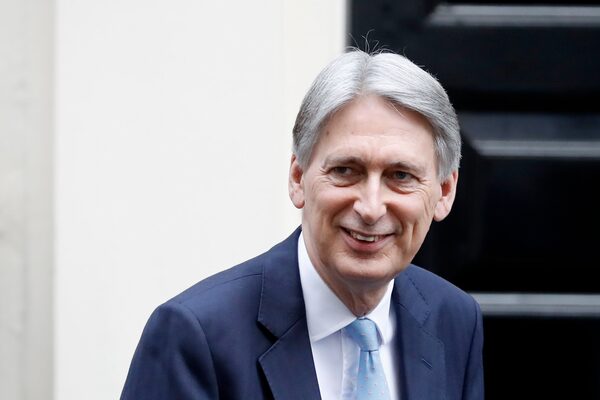Briefing highlights
- What we might see in federal budget
- Barrick, Newmont end fight with joint venture
- Stocks, loonie, oil at a glance
- What to watch for in debt report
- What to expect in housing report
- What else to watch for this week
- Boeing shares slide after crash
- From today’s Globe and Mail
Awaiting the budget
SNC-Lavalin Group Inc. may not get its wishes in the run-up to the federal election, but you just might get some of yours.
We’re just days away from Finance Minister Bill Morneau’s March 19 budget, and there’s speculation that the beleaguered Trudeau Liberals are going to giveth.
Obviously, there won’t be anything in that document for SNC-Lavalin, such as the deferred prosecution agreement the engineering company wants. That could come later and may not come at all. And not from Mr. Morneau.
But there will, no doubt, be something for you.

Finance Minister Bill MorneauSean Kilpatrick/The Canadian Press
Mr. Morneau has more money at his fingertips. And it is a pre-election budget at a time when the Liberal government is scrambling amid the controversy over SNC-Lavalin.
“The current challenges faced by the Trudeau government make it more likely that the government will take actions that are seen to benefit Canadians well before the October election,” said Bank of Nova Scotia chief economist Jean-François Perrault.
“And with revenues growing at almost twice the pace expected in the last fiscal update, the federal government has plenty of resources to deploy while sticking to its deficit forecast.”
There’s speculation Mr. Morneau will at least move on housing affordability, notably for first-time homebuyers priced out of expensive markets and hit by higher interest rates and mortgage-qualification stress tests brought in by the federal bank regulator early last year.
“Though we expect measures targeted to first-time homebuyers, through possible tweaks to the Home Buyers Plan, or extended amortizations, what measures will be rolled out is entirely unclear at this point,” Mr. Perrault said.
“Whatever course of action is decided will surely be aimed at having as immediate an impact on the housing market as possible,” he added in a recent economic forecast.
“This should presumably have some impact on residential investment in the second or third quarters.”
Royal Bank of Canada warned in a recent economic report that Mr. Morneau should be careful, lest any measures drive home prices higher again, particularly after the federal, B.C. and Ontario governments worked so hard to cool housing markets.
That may not stop a troubled government heading into an election, though.
“There may also be scope for the federal government to increase the Canada Child Benefit (CCB), which would see families receive larger payments through the program as early as this summer,” Mr. Perrault said.
“While the government has not given any indication that it is considering this, such a policy would hit multiple objectives: Provide a timely cash infusion to families with children immediately ahead of the election and in so doing reduce out-of-pocket costs of child care for Canadian families,” he added.
“A reduction in child care costs effectively increases housing affordability by raising disposable income, and by encouraging more women to work, housing affordability may get a further kick from higher family incomes. We’re penciling in a modest increase in the CCB in our outlook. This should provide an additional boost to [household] consumption, as was observed when the CCB was first introduced.”
Remember, too, that the economy is stumbling, having eked out only tiny growth in the fourth quarter of last year, with little better expected in the current quarter.
But Mr. Morneau can certainly afford something.
Revenues have been climbing, allowing the government to post a small surplus of $324-million so far in the 2018-19 fiscal year, compared to a deficit just shy of $9-billion a year earlier.

Source: Department of Financeglobe
“On the policy front, if history is any guide, Ottawa will likely prioritize program spending over tax relief,” said Bank of Montreal senior economist Robert Kavcic.
“While we’re not in the game of predicting budget measures, the recent chatter has centred on areas such as expanded universal pharmacare, skills training and measures to help housing affordability,” he added in a recent look at federal-provincial budget season.
“On the latter, there has been some hints that Ottawa could bring back 30-year amortizations for first-time buyers, but the details at this point are minimal. At any rate, these measures could be big ‘selling features’ in the budget that come with a small immediate dollar figure attached to them – on the last point, we suspect Ottawa will not want to run even deeper deficits at this point in its mandate.”
Read more
- Bill Curry: Advocates hopeful budget will include new pension protections
- RBC warns Bill Morneau against stoking home prices again with budget measures
- Ottawa now has room ‘to cut the deficit, spend on new programs, or (gasp!) cut taxes’
- Bill Curry: Federal government tracking toward smaller-than-planned deficit for 2018-19
- Follow our coverage of the SNC-Lavalin controversy
Barrick, Newmont in joint venture
Barrick Gold Corp. and Newmont Mining Corp. have ended their tussle with a joint venture for their operations in Nevada.
The “historic accord,” as the companies called it, means Barrick is dropping its hostile bid for Newmont.
When all is said and done, they added, the Nevada operations will be the biggest single gold producer in the world, at more than 4 million ounces on a pro-forma basis in 2018.
Barrick would own 61.5 per cent of the venture, and also be its operator, as The Globe and Mail’s Niall McGee.
“We listened to our shareholders and agreed with them that this was the best way to realize the enormous potential of the Nevada goldfields’ unequalled mineral endowment, and to maximize the returns from our operations there,” said Barrick chief executive officer Mark Bristow, noting that the two companies have been operating in Nevada on their own for decades and had never come to terms for a co-operative effort.
“We are finally taking down the fences to operate Nevada as a single entity in order to deliver full value to both sets of shareholders, as well as to all our stakeholders in the state, by securing the long-term future of gold mining in Nevada.”
Read more
Markets at a glance
Read more
What to watch for this week
It's all about Canadian housing and consumer debt. And, of course, Brexit, which just keeps on giving.
Here's what to watch for:
TUESDAY
This is the first of a key few days for Prime Minister Theresa May in her attempts to settle on an end-game for Britain to quit the European Union.

Prime Minister Theresa MayDANIEL LEAL-OLIVAS/AFP/Getty Images
Here's how it's shaping up;
“On March 12, Parliament will vote on PM May’s deal,” said BMO senior economist Jennifer Lee.
“If it is rejected, then lawmakers will vote on March 13 if they want to leave the EU without a deal,” she said.
“If the majority votes ‘no,’ then they will vote on March 14 to ask Brussels for more time ... The likelihood of getting to the March 14 vote is high. But having Brussels approve the extension is another story. They will not, unless the U.K. outlines exactly how the extra time will be used.”
Also on tap is the February reading of U.S. inflation, which economists generally forecast will put the annual pace at 1.6 per cent, unchanged from January.
WEDNESDAY
As Brexit plays out, Britain’s Chancellor of the Exchequer, Philip Hammond, delivers a spring statement expected to show “an unexpected windfall” for his economy, as CMC Markets chief analyst Michael Hewson projected.

Philip HammondTOLGA AKMEN/AFP/Getty Images
“The amount of tax paid in terms of tax receipts has proved to be surprisingly strong, despite the hysteria in some quarters that a vote to leave the EU would undermine the U.K. economy,” Mr. Hewson said.
“It is true that some business investment has dried up as we head towards the exit date at the end of the month, but all the dark warnings that we heard in the run up to the June, 2016, referendum have thus far failed to materialize.”
The U.S. government, meanwhile, reports on January orders for durable goods, expected to show a decline of up to 0.5 per cent.
Watch, too, for quarterly results from Empire Co. and Quebecor Inc.
THURSDAY
This is the day Canadians learn how much we’re worth, how much we owe and how that compares to how much we earn.
BMO expects Statistics Canada to report that the key measure of household debt to disposable income was “flat to slightly lower” in the fourth quarter as weaker increases in incomes helped to offset softer growth in credit.
“The housing market slowed dramatically last year and we’re waiting to see signs of stability in the early part of 2019,” said Benjamin Reitzes, BMO’s Canadian rates and macro strategist.
"That’s driven credit growth substantially lower to the slowest pace in 35 years," he added.
“Meantime, income growth was mediocre, pushing the annual increase down, limiting any potential improvement in debt ratios.”
Transat AT reports corporate results.
FRIDAY
The Canadian Real Estate Association is expected to report that national home sales and average prices slipped 4 and 5 per cent, respectively, in February from a year earlier.
The MLS home price index, considered a better measure, is forecast by BMO to show a gain of 0.3 per cent, which Mr. Reitzes said would be the slowest in almost 10 years.
“Vancouver continues to struggle and is in full correction mode,” Mr. Reitzes said.
“The Prairies remain under pressure as the hangover from energy price volatility persists and broader activity in the region is relatively soft,” he added.
“Ottawa and Montreal continue to be the bright spots amid decent affordability and firm economic activity. Toronto was modestly weaker in February, but weather was a big factor in the month (as my many flight delays and school closures can attest to).”
We'll also get to take the temperature of the country's manufacturing sector, with economists expecting Statistics Canada to report anything from a sales decline of 0.5 per cent to a gain of the same magnitude.
“We expect a string of soft headline economic reports in Canada to persist with a 0.5-per-cent dip in manufacturing sales in January to build on 1.3-per-cent and 1.7-per-cent drops in December and November, respectively,” RBC economists said in a lookahead.
“We expect details will be less bad, though,” they added.
“Most of the weakness we expect in January is from a price-led 3.5-per-cent drop in petroleum and coal sale values – which won’t likely last with oil prices moving up off December lows – and a 7-per-cent drop in the often-volatile aerospace component. Excluding those components, we expect sales inched up modestly in January.”
The Bank of Japan, meanwhile, is expected to leave rates unchanged “despite the recent weakness in activity data,” Capital Economics said.
“Many board members remain concerned about the potential negative impact of prolonged easing on financial stability.”
More news
From today’s Globe and Mail
- David Parkinson: Canada has a skills shortage – but which skills, and where? Lack of data leaves the experts unsure
- David Milstead, James Bradshaw: TD extends CEO Bharat Masrani’s pay agreement, gives him hefty compensation boost
- Niall McGee: Newcrest Mining takes 70 per cent stake in B.C. mine from Imperial Metals